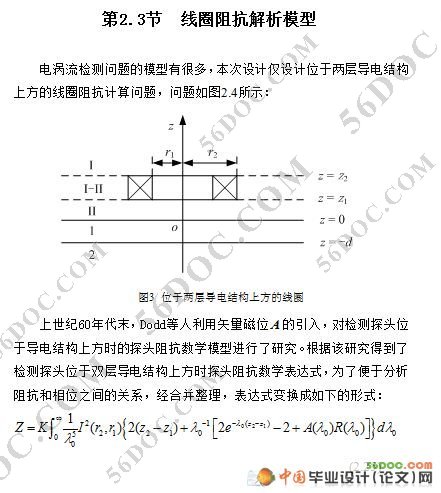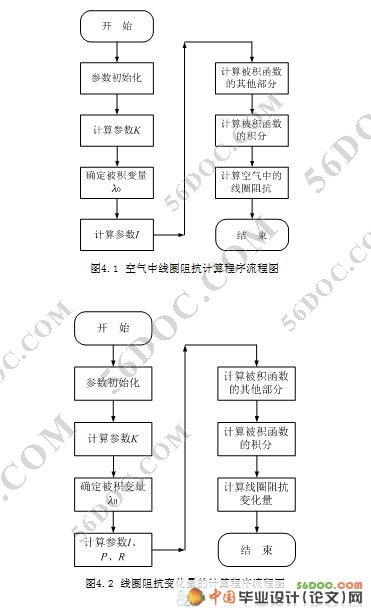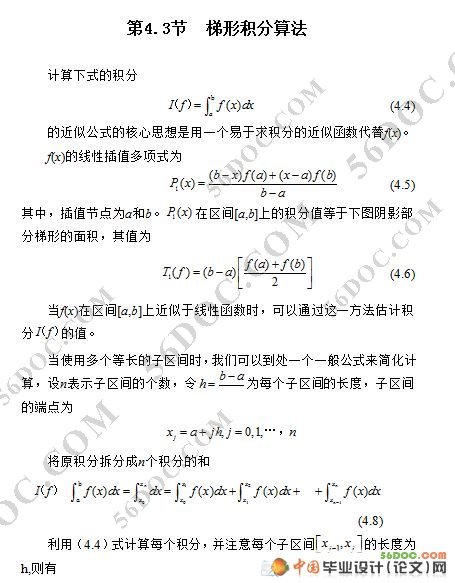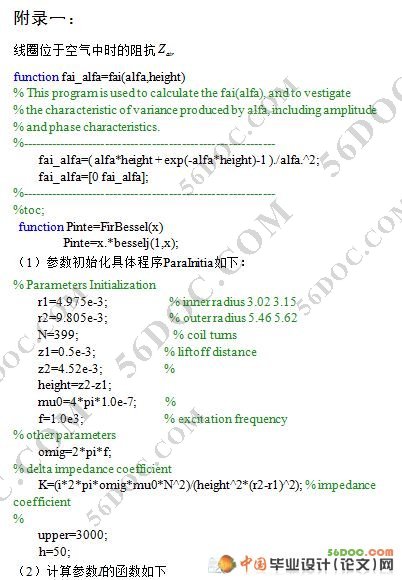电涡流检测仿真软件的设计(附MATLAB程序)(测控技术)☆
无需注册登录,支付后按照提示操作即可获取该资料.
摘 要
电涡流检测技术在近年来发展十分迅猛,以其很高的可靠性和精确度受到广泛的欢迎,在各行各业的检测系统中被大量地应用。MATLAB是一款具备强大数学运算能力的软件,被广泛的应用于科学计算、控制系统以及信息处理等领域的分析、仿真和设计工作。
电涡流无损检测领域是当前一个倍受关注的领域,作为一个新兴的边缘学科领域,有着蓬勃的生机。本设计就如何提高检测领域的水平,应用MATLAB仿真软件,实现对检测探头位于双层导电结构上方时,探头阻抗数学表达式的科学运算以及可视化输出。从而分析被检材料电导率、磁导率、厚度,和线圈阻抗之间的关系。同时还可以利用该模型,研究如何去除提离、边沿等因素给电涡流检测带来的干扰。经过硬件和软件两个层面上的分析与设计,选择了圆柱型空心线圈阻抗模型。
准确快速地得到检测值从而对缺陷、裂纹进行重构是本次设计的根本目的。
关键词:电涡流检测 ;MATLAB ;控制系统 ;检测探头 ;阻抗
ABSTRACT
Eddy current testing technology developed rapidly in recent years, with its high reliability and accuracy are widely popular in all walks of life detection system has been extensively applied. MATLAB is a powerful mathematical capabilities with the software, widely used in scientific computing, control and information processing systems analysis, simulation and design work.
Field eddy current nondestructive testing is the current focus in a field, as an emerging interdisciplinary field, with vigor. The design of the field on how to improve the level of detection, application MATLAB simulation software, to realize the detection of double-layer conductive structure at the top of the probe, the probe impedance mathematical expression of scientific computing and visualization output. Were seized materials to analyze the conductivity, magnetic permeability, thickness, and the relationship between the coil impedance. The model also can be used to study how to remove the lift-off, edges and other factors to the interference caused by eddy current testing. After two levels of hardware and software analysis and design, selected the cylindrical hollow coil impedance model.
Be detected quickly and accurately to the value of the defect, crack reconstruction is the fundamental purpose of this design.
Keywords: Eddy current testing; MATLAB; control system; test probe; impedance
传感技术的信息时代信息获取—处理—传输链条的源头技术,是信息技术的关键和基础,在科学研究和工业生产中扮演着越来越重要的角色。它与工业的发展紧密相连,其发展水平决定着一个国家的工业化水平。
涡流无损检测(EC NDT: Eddy Current Non-Destructive Testing)是19世纪70年代兴起的一种无损检测技术。它利用电磁感应原理,通过测定被检工件内感生的涡流变化来无损地评定导电材料及其工件的某些性能,或发现缺陷的无损检测方法。涡流检测与射线检测(RT: Radiographic Testing)、超声检测(UT: Ultrasonic Testing)、磁粉检测(MT:Magnetic Particle Testing)、渗透检测(PT:Penetrant Testing)并称为五大无损检测技术(NDT: Non-Destructive Technology)。
涡流检测与射线检测相比,对人体没有辐射危害,且能够在恶劣环境下工作;与超声检测相比,无需耦合剂;与磁粉检测相比。可用于任何导电媒质(铁磁质、抗磁质、顺磁质);与渗透检测相比,不仅可检测部件的表面开口缺陷,还可检测内部缺陷。对于多层结构中出现的缺陷,涡流检测具有独特的优势。因此涡流检测航空航天、石油化工、交通运输、能源电站建设和船舰建造等部门广泛应用。




目 录 24000字
第一章 电涡流检测概述 1
第1.1节 涡流检测技术的历史 1
第1.2节 涡流检测的研究现状 4
第1.3节 涡流检测技术的发展趋势 6
第二章 电涡流检测的基础理论 8
第2.1节 电涡流检测阻抗分析法 8
2.1.1 线圈探头的阻抗分解 8
2.1.2 阻抗平面图 10
2.1.3 阻抗规范化 11
第2.2节 电涡流集肤效应及其影响 12
第2.3节 线圈阻抗解析模型 14
第三章 Matlab编程 16
第3.1节 Matlab介绍 16
第3.2节 Matlab编程基础 21
3.2.1 变量和数学运算 21
3.2.2 数组和矩阵 25
3.2.3 结构体 28
第3.3节 M文件编程 29
3.3.1 M文件通用格式及分类 29
3.3.2 M文件编辑器 31
3.3.3 流程控制 31
第四章 电涡流检测仿真程序 33
第4.1节 圆柱型空心线圈阻抗模型 33
第4.2节 线圈阻抗计算流程图 33
第4.3节 梯形积分算法 35
第4.4节 阻抗计算程序的具体模块实现 36
4.4.1 参数初始化模块 36
4.4.2 参数I的计算程序 38
4.4.3 参数P的计算程序 39
4.4.4 参数R的计算程序 39
4.4.5 主程序 40
第4.5节 图形显示 41
第4.6节 程序验证 43
第五章 结论 45
参考文献 46
附录一: 48
附录二: 50
翻译部分 53
英文原文 53
中文译文 60
致 谢 67
